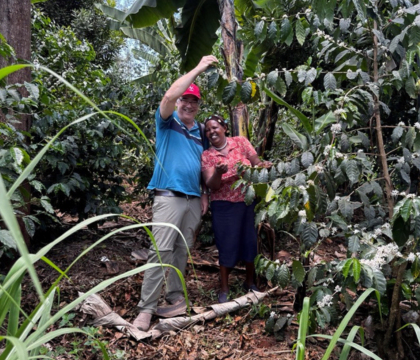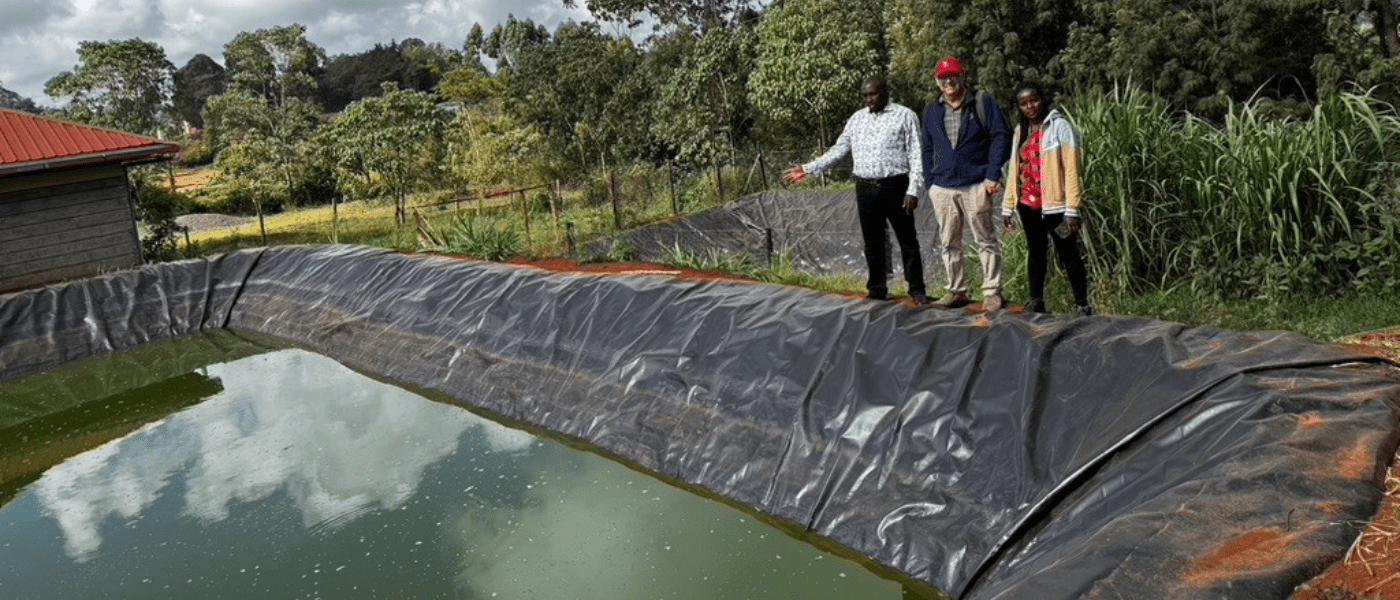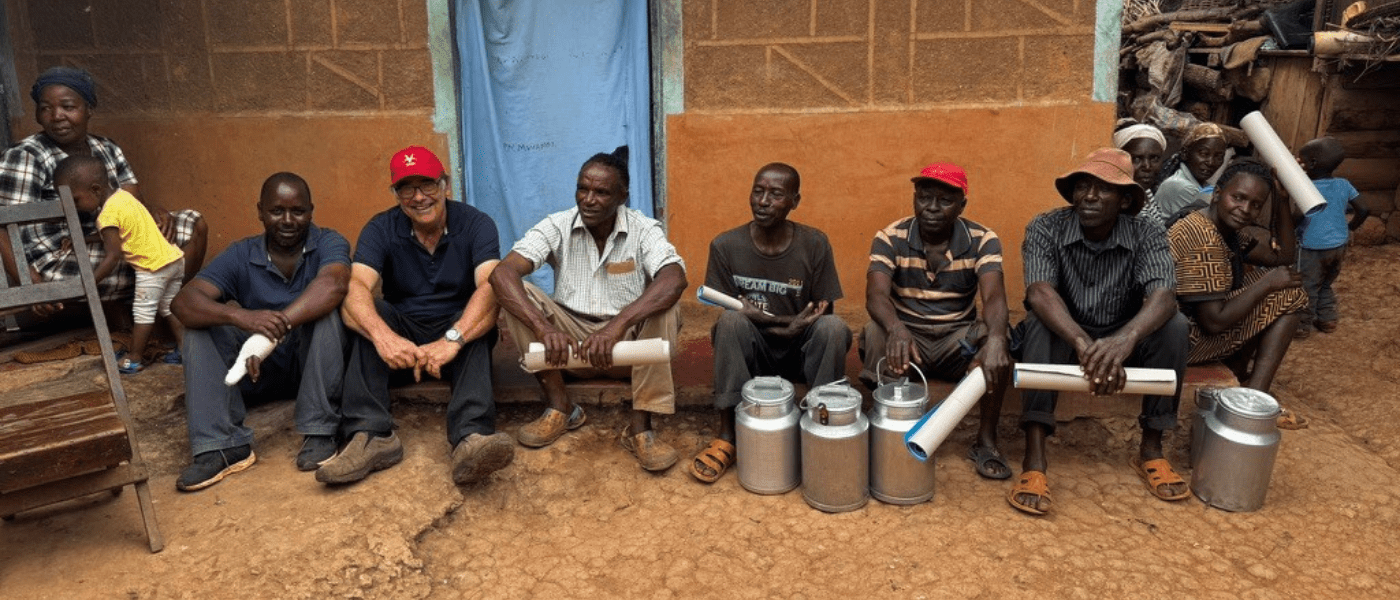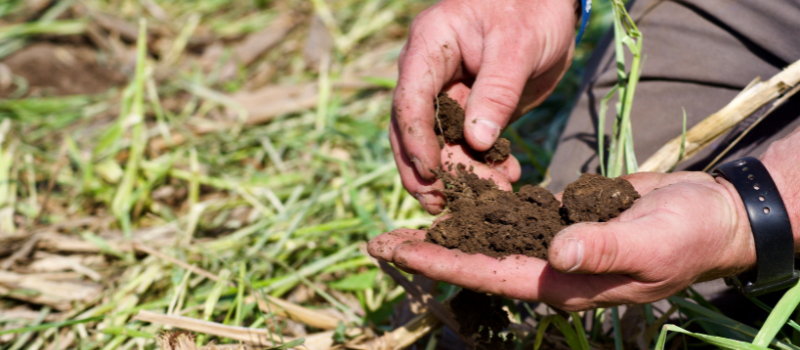#VETSVolunteerVoices brings you inspiring stories from the field, showcasing the impactful work of our dedicated VETS program volunteers. Meet Donald Hilborn, an Agricultural Advisor who spent three weeks in rural Kenya (January-February 2025). This is Donald's second VETS volunteer placement in Kenya.
Bridging Knowledge and Practice in Sustainable Dairy Farming
When I joined the VETS program as an Agricultural Advisor, I saw a chance to connect my experience as an extension engineer and farmer in Ontario with the realities of smallholder dairy farming in Kenya.
Over the course of my placement, I partnered with Wakulima Dairy’s extension team to support farmers in getting the most from their land—not by introducing costly new technologies, but by helping them make better use of what they already had.
Through 13 training sessions and 31 farm visits, we focused on practical, low-cost techniques—refining manure management, composting, and runoff use—to boost soil health, crop yields, and dairy productivity. It was all about small changes with lasting impact.
 PHOTO: Donald with dairy & coffee farmer couple in Nyeri County.
PHOTO: Donald with dairy & coffee farmer couple in Nyeri County.
 PHOTO: Donald, farmer, and coffee tree fertilized by biogas slurry.
PHOTO: Donald, farmer, and coffee tree fertilized by biogas slurry.
 PHOTO: Donald (red hat) with training attendees in Matiraini.
PHOTO: Donald (red hat) with training attendees in Matiraini.
Turning Manure into Gold: Sustainable Soil Management
One of the biggest challenges for dairy farmers in Kenya is producing enough high-quality feed for their cows. With limited land, the solution isn’t more acreage—it’s getting more from the soil they already have. That’s where effective manure management comes in.
During my placement, I encouraged farmers to capture all the manure produced on their farms and blend it with organic materials like leaves and household waste to create nutrient-rich compost. I shared simple aeration techniques, including how to build compost piles that allow air to flow from the bottom and sides, with a central vent to support decomposition. These small adjustments can significantly enhance soil structure and fertility.
I also introduced ways to make better use of farmyard runoff—as both irrigation and a natural source of nitrogen. In most cases, it was just a matter of refining existing practices. And once farmers saw the potential to improve their crop yields using what they already had, they were eager to apply the changes.
 PHOTO: Donald with Wakulima colleagues at a water storage pond at Craebino Parish Catholic Church, where manure and runoff from the dairy will be used to fertilize crops.
PHOTO: Donald with Wakulima colleagues at a water storage pond at Craebino Parish Catholic Church, where manure and runoff from the dairy will be used to fertilize crops.
The Untapped Potential of Biogas Slurry
One particularly eye-opening aspect of my placement was biogas slurry management. Nearly half the farms I visited had small biogas digesters, which are oxygen-free tanks that convert manure into clean cooking fuel—a practice that helps reduce deforestation and improve indoor air quality.
However, many farmers were underutilizing the slurry byproduct—a nutrient-rich liquid that can be applied to crops to improve soil health. Instead of being evenly distributed, it was often left to waste or applied sporadically. I worked with farmers to develop better application methods, ensuring that this natural fertilizer was being used efficiently to boost crop growth. Seeing farmers recognize the value of biogas slurry beyond cooking fuel was a major success. It’s a simple but powerful way to improve both crop yields and environmental sustainability.
Women at the Heart of Dairy Farming
Another encouraging aspect of my placement was the strong participation of women farmers—67% of the farmers I trained were women. In this region, women are truly the backbone of dairy farming, taking on daily responsibilities like feeding, milking, and transporting milk to the dairy collection points.
While I didn’t formally assess household decision-making structures, I was consistently impressed by how engaged and curious the women were. They asked thoughtful questions, took notes diligently, and showed a genuine eagerness to implement what they were learning—clear signs of their commitment to improving productivity on their farms. Their enthusiasm during training was a powerful reminder of the critical role women play in building sustainable agricultural systems in Kenya.
A Success Story: When Dairy and Coffee Farming Work Together
While working with Wakulima Dairy farmers, I quickly realized that many of them were also coffee farmers. They saw an opportunity to repurpose dairy farm byproducts—like compost and biogas slurry—to enrich their coffee fields and boost overall productivity.
One farmer, Irene Wairimu, stood out. She had already adopted a biogas system on her farm to replace firewood for cooking, improving both efficiency and household air quality. But like many farmers, she hadn’t always recognized the full nutrient value of the biogas slurry it produced.
 PHOTO: Irene Wairimu proudly shows off her coffee trees, fertilized using biogas slurry from her dairy manure digester.
PHOTO: Irene Wairimu proudly shows off her coffee trees, fertilized using biogas slurry from her dairy manure digester.
During my visit, Irene gave me a tour of her fields and explained how she had begun applying both slurry and compost more strategically to her maize and coffee crops. The results were clear: high-yielding, uniform maize, improved feed storage for her dairy cows, and healthier, more productive coffee trees—all contributing to a more resilient and diversified farm system.
Her story reflects the broader potential of sustainable farming practices in Kenya. When farmers close the loop between livestock and crops, they build more productive, climate-resilient farms that support both livelihoods and the environment.
Advice for Future VETS Volunteers
For anyone considering a VETS placement in agricultural advisory, I have two key pieces of advice:
- Observe first, then advise. Before suggesting changes, take time to understand local practices and what’s already working. Farmers have deep knowledge of their land—our role is to enhance and refine, not replace.
- Small changes matter. You won’t change the world overnight, but small, practical tweaks can improve a farm, a family’s livelihood, and an entire community’s future.
Looking Ahead: Why I Keep Coming Back to VETS
This was my second placement with the VETS program, and what keeps drawing me back is how streamlined and well-organized it is. VETS creates a space where knowledge providers and knowledge users connect in meaningful, practical ways, making real change possible. There’s something deeply rewarding about using your skills in a way that genuinely benefits others—and with partners like Wakulima Dairy, the program offers an ideal platform for sustainable, community-led impact.
As I look to the future, I’m reminded that sustainable farming isn’t only about the soil or the livestock—it’s also about building local knowledge, strengthening networks, and ensuring that positive practices carry on long after volunteers return home. And that’s exactly why I’ll be back.
 PHOTO: After a group training session in Gachuhe village, Donald (4th from left) rests with local farmers and discusses composting, digestors and soil pH.
PHOTO: After a group training session in Gachuhe village, Donald (4th from left) rests with local farmers and discusses composting, digestors and soil pH.
VETS is an 8-year initiative (2020-2028) to improve the economic and social well-being of marginalized people, particularly women and girls, in 6 countries across Africa and Asia. In collaboration with local partners, the program is implemented through 190 Canadian volunteers on international assignment and is generously funded by Global Affairs Canada. Learn more.





